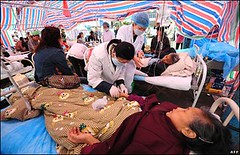
A makeshift Chinese hospital treating victims of the earthquake. It has been estimated by the state news agency that the death toll could rise to 50,000.
Originally uploaded by Pan-African News Wire File Photos
YINGXIU, China (AFP) - - China said Thursday that over 50,000 people had likely died in the devastating earthquake that hit its southwest as time runs out to save survivors buried in the rubble of broken communities.
Experts said the search-and-rescue operation was entering its most crucial phase yet four days after the 7.9-magnitude quake struck, with the chances of finding survivors diminishing by the hour.
"The deaths are estimated to be over 50,000," state television said, citing figures from the national quake relief headquarters.
The epic scale of Monday's quake is becoming clearer as teams hike into the remote epicentre in Sichuan province, where whole towns were levelled.
"If there are some survivors under such conditions, it would be a matter of luck, or a miracle," said Zhang Zhoushu, vice director of the state-run China Earthquake Disaster Prevention Centre.
Yet amidst the tragedy , miracles did occur.
In Yingxiu, a town at the epicentre, rescue workers pulled an 11-year-old girl out of the rubble 68 hours after the quake demolished her school, an AFP reporter who made it into the stricken community witnessed.
Rescuers were sifting through the debris when they heard a voice.
"It's wonderful, she's alive!" a delighted onlooker shouted as the girl was pulled out on a stretcher and given a small cup of water.
China has rebuffed most foreign offers to send rescuers, but late Thursday a Japanese group of 31 arrived, the first foreign search and rescue team accepted by Beijing.
"Most people are saved in the first three or four days," Willie McMartin, director of the British-based charity International Rescue Corps, told AFP in Hong Kong where his team is trying to get permission to enter China.
"People can survive up to 15 days, but that is when you are talking about miracles, and miracles do not happen very often."
A planeload of aid from Taiwan's Red Cross Society arrived late Thursday in Sichuan, where officials upped the confirmed death toll to more than 19,500, with tens of thousands more missing or entombed in debris.
As the military ramped up its rescue efforts with more troops and aircraft, a new threat emerged from creaking dams and reservoirs shaken by the quake.
State-run television said authorities had found "dangerous situations" at more than 400 reservoirs -- two of them major -- across five provinces.
Underlining the desperate efforts, China launched a mass public appeal for thousands of shovels, hammers and cranes, saying some rescuers were having to shift huge concrete slabs by hand to get to survivors.
"As long as there is only a glimmer of hope we will never give up," vowed China's vice health minister Gao Qiang.
Premier Wen Jiabao ordered another 30,000 troops and 90 helicopters to the area to bolster operations, while the military began its first major air drops of tens of thousands of food packets, clothes and blankets.
Sniffer dogs were also sent in to help look for survivors.
"We must use all our forces, and save lives at whatever cost. Life is the most precious thing," Wen told a meeting at quake relief headquarters.
The military is also deploying 30 more transport aircraft for supplies and troops, and an AFP reporter saw dozens of army trucks heading to the disaster zone from the provincial capital Chengdu.
"The worst has been watching people die , knowing you could not do anything for them," said Li Rui, a doctor in Wudu, where beds were laid out in a former open-air market.
Across the province, rescue teams and volunteers fought to clear mounds of concrete slabs, metal and wood, dragging out bodies and bloodied survivors of China's worst quake for a generation.
A girl murmuring "Save me, save me" was pulled from the concrete heap that was once her school some 50 hours after it collapsed in the quake.
Rescuers blasted the last rocks off a road into the epicentre late Thursday after working non-stop for two days, finally allowing rescuers to bring desperately-needed help to survivors by land.
Xinhua said spillways had been opened at the Zipingpu Dam near the quake's epicentre to release water following reports of "dangerous cracks" threatening Dujiangyan downstream.
Meanwhile, China's national tourism authority said nearly 900 overseas tourists were stranded but believed to be safe, while a Chinese military helicopter flew 33 visitors from Britain, France and the United States out of the area.
No comments:
Post a Comment